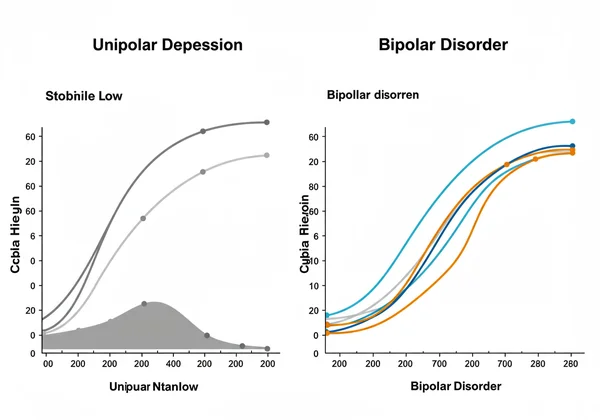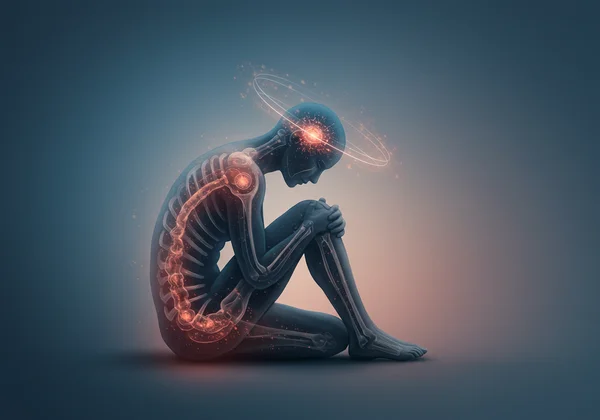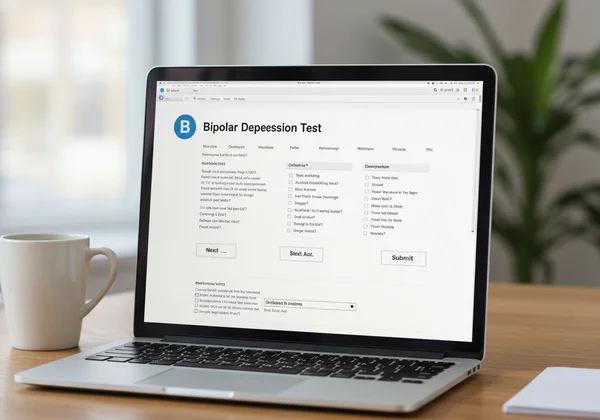Bipolar Depression: Symptoms, Risks, & When to Take a Test
October 11, 2025 | By Felicity Hayes
Introduction: The Misunderstood Shadow: Why Bipolar Depression is More Than Just Sadness
Have you ever felt trapped in a deep, heavy fog of sadness, only to find that standard treatments for depression don't seem to lift it? For many, this experience is confusing and isolating. The low periods feel like depression, look like depression, but are part of a much larger, more complex picture. This is the reality of bipolar depression, a condition often overshadowed by its more energized counterpart, mania. Have you ever wondered if your depression is something more? Understanding this distinction is the first step toward clarity and effective management. This guide will illuminate the unique signs of bipolar depression, explore why it's so frequently misdiagnosed, and help you decide when it's time to take a bipolar depression test as a starting point for a conversation with a professional. Gaining insight into your emotional patterns can be a powerful move, and an initial screening like the free bipolar test can provide a structured way to begin.

Understanding Unique Bipolar Depression Symptoms
Bipolar depression isn't just a synonym for feeling down; it carries a distinct set of characteristics that separate it from other forms of depression. Recognizing these nuances is crucial for anyone seeking answers about their persistent mood shifts. It’s about understanding the specific nature of the lows within the broader context of bipolar disorder.
What Makes Bipolar Depression Different from Unipolar Depression?
What truly sets bipolar depression apart from regular depression (also known as major depressive disorder) is the experience of mania or hypomania. Unipolar depression involves only depressive episodes. In contrast, bipolar disorder is defined by a cycle between depressive states and periods of elevated mood. Even if you haven't experienced a full-blown manic episode, a history of even milder, high-energy periods (hypomania) is the key that unlocks a potential bipolar diagnosis. Bipolar depressive episodes also tend to be more severe, occur more frequently, and are often shorter than unipolar depressive episodes.

Key Signs of Bipolar Depression (According to DSM-5 Criteria)
While sharing some symptoms with unipolar depression, like persistent sadness and loss of interest, bipolar depression often presents with what are known as "atypical features." These are critical clues that can point toward a bipolar spectrum condition. According to DSM-5 criteria, these specific indicators include:
- Excessive Sleep (Hypersomnia): Instead of insomnia, you might find yourself sleeping much more than usual—often over 10 hours a day—yet still waking up feeling unrefreshed.
- Increased Appetite or Weight Gain: It's common to experience intense cravings, especially for carbohydrates, leading to noticeable weight gain. This is often the opposite of the appetite loss seen in other forms of depression.
- Heavy, "Leaden" Limbs (Leaden Paralysis): This is a profound physical sensation where your arms and legs feel incredibly heavy and difficult to move, as if they were made of lead.
- Intense Sensitivity to Rejection: You might experience a long-standing pattern of feeling deeply hurt by criticism or perceived rejection, which can place a heavy strain on your relationships.
- Slowed Thoughts and Movements (Psychomotor Retardation): You might notice your thoughts and physical actions feel noticeably slower, almost sluggish. Others might even comment on it.
Recognizing Depressive Episodes with Mixed Features
One of the most challenging aspects of bipolar disorder is the experience of depressive episodes with mixed features. This is when you experience symptoms of depression and mania or hypomania simultaneously. Imagine feeling hopeless, empty, and exhausted, but at the same time, your mind is racing with agitated thoughts, you feel internally restless, and you're irritable and on edge. This painful combination of low mood and high energy can increase the risk of impulsive behavior and is a significant red flag that your depression is part of a bipolar pattern. If this sounds familiar, an online bipolar screening can help you organize these complex feelings.

Why Misdiagnosis of Bipolar Depression is So Common
A significant number of people with bipolar disorder are first diagnosed with unipolar depression. This misdiagnosis can delay appropriate treatment for years, leading to frustration and worsening symptoms. Understanding why this happens can empower you to advocate for yourself in a clinical setting.
The Symptom Overlap: When it Looks Like "Regular" Depression
People are far more likely to seek help during a depressive episode than during a manic or hypomanic one. The highs can feel productive, exciting, or simply like a "good mood," so they often go unreported. When a doctor only hears about the symptoms of depression—sadness, fatigue, and hopelessness—it’s logical to conclude the diagnosis is unipolar depression. Without the full picture that includes the "up" periods, the crucial bipolar element is missed. This is where symptom tracking becomes vital.
Differentiating Bipolar 1 Depression from Bipolar 2 Depression
The subtlety of hypomania is another reason for misdiagnosis, particularly with Bipolar 2 depression. In Bipolar 1, manic episodes are severe and cause significant impairment in daily life, sometimes requiring hospitalization. In Bipolar 2, the elevated periods are less severe (hypomania) and may manifest as increased productivity, creativity, and sociability. Because hypomania doesn't feel "bad," it's rarely mentioned to a doctor, leaving only the depressive episodes on the table for discussion. A thorough screening tool can prompt you to reflect on these less obvious high-energy states.
The Risks of Unrecognized Bipolar Depression
Allowing bipolar depression to go unrecognized is more than just an inconvenience; it carries significant risks that can affect every area of a person's life. Getting the right name for your experience is the first step toward mitigating these dangers and finding a path to stability.
Impact on Daily Life, Work, and Relationships
The severe and recurrent nature of bipolar depression can make it incredibly difficult to maintain consistency. It can strain relationships with friends and family who struggle to understand the unpredictable mood shifts. At work or school, the profound lack of energy and motivation can lead to poor performance and missed opportunities. The emotional volatility creates a foundation of instability that can make long-term planning and goal achievement feel impossible. Understanding your condition through a preliminary tool like a bipolar assessment test can be the first step to regaining control.
Why Accurate Diagnosis is Essential for Effective Treatment
This is perhaps the most critical reason to seek clarity. The treatments for unipolar depression and bipolar depression are fundamentally different. While antidepressants are a frontline treatment for unipolar depression, prescribing them alone to someone with bipolar disorder can be ineffective or, in some cases, dangerous. Antidepressants can trigger mania, hypomania, or rapid cycling in individuals with bipolar disorder, ultimately destabilizing their mood further. For bipolar disorder, treatment usually starts with a mood stabilizer. This type of medication helps manage the entire cycle of highs and lows, bringing more stability.
When to Consider a Bipolar Depression Test
If you've read this far and find yourself identifying with the descriptions of atypical symptoms, mixed features, or a history of failed treatments, it may be time to explore further. An online screening tool is not a diagnosis, but it is an invaluable, private, and accessible step toward understanding.
Are Your Depressive Symptoms Persistent or Unresponsive to Current Treatment?
If you have been treated for depression but your symptoms persist, or if treatments seem to work for a while before failing, it is a strong indicator that something else may be going on. This is a classic experience for many "Clarity Seekers" who intuitively feel their diagnosis doesn't capture their full experience. This lack of response is a compelling reason to consider whether your depression is part of the bipolar spectrum.
How Online Screening Tools Can Help
In a world of confusion, a structured tool can provide a beacon of clarity. Online screening tools, such as the one on our site, are designed based on established clinical criteria (like the Mood Disorder Questionnaire - MDQ) to help you identify patterns in your moods, energy, and behavior. Taking a few minutes to answer questions in a confidential setting can give you:
-
Immediate Insight: Receive a preliminary assessment that can validate your concerns.
-
A Starting Point for Discussion: Bring your results to a doctor or therapist as a concrete way to start a conversation.
-
Personalized Understanding: Opting for an AI-powered report can offer deeper insights into your specific challenges and suggest actionable steps.

It's a proactive, empowering step you can take right now. If you're ready to explore your moods more deeply, try our free tool today.
Your Path to Clarity: Taking the Next Step in Understanding Your Moods
Navigating the world of mental health can feel like trying to solve a puzzle without all the pieces. Bipolar depression is one of those crucial pieces that is often missed, leaving individuals feeling stuck and misunderstood. By learning to recognize its unique symptoms, understanding the risks of misdiagnosis, and knowing when to seek more information, you are taking control of your journey.
Remember, understanding is not a destination but a path. A screening tool is simply the first landmark on that path, guiding you toward a more informed conversation with a healthcare professional. Your experiences are valid, and finding the right language to describe them is a victory in itself. Take the next step toward clarity today by visiting BipolarTest.net to begin your confidential assessment.
Frequently Asked Questions About Bipolar Depression and Testing
How do professionals typically test for bipolar disorder?
A professional diagnosis is made by a qualified healthcare provider, like a psychiatrist or psychologist, through a comprehensive clinical interview. They will ask detailed questions about your personal and family medical history, your symptoms, and your experiences with both depressive and elevated moods. There is no blood test or brain scan for bipolar disorder; diagnosis is based entirely on your reported experiences and observed behavior.
What is the main difference between Bipolar 1 and Bipolar 2 depression?
The depressive episodes themselves can be very similar in both Bipolar 1 and Bipolar 2. The key difference lies in the severity of the "high" episodes. Bipolar 1 is defined by at least one full manic episode, which involves severe mood disturbances and significant functional impairment. Bipolar 2 is defined by at least one hypomanic episode (a less severe high) and at least one major depressive episode.
What are some signs of bipolar depression that are often missed?
Signs that are frequently overlooked include sleeping for more than 10 hours a day (hypersomnia), a persistent feeling of physical heaviness (leaden paralysis), and experiencing agitated, restless energy at the same time as feeling hopeless and sad (a mixed state). Because these don't fit the "classic" picture of depression, they are often missed without a targeted screening.
What should I do after completing an online bipolar depression test?
An online test is a powerful starting point, not an endpoint. After completing a screening at a site like BipolarTest.net, the most important next step is to schedule an appointment with a doctor or mental health professional. Print or save your results and use them to facilitate the conversation. They provide a valuable summary of your experiences and help ensure your concerns are heard clearly.
Disclaimer: This content is for informational and educational purposes only and does not constitute medical advice, diagnosis, or treatment. Always seek the advice of a qualified health provider with any questions you may have regarding a medical condition.